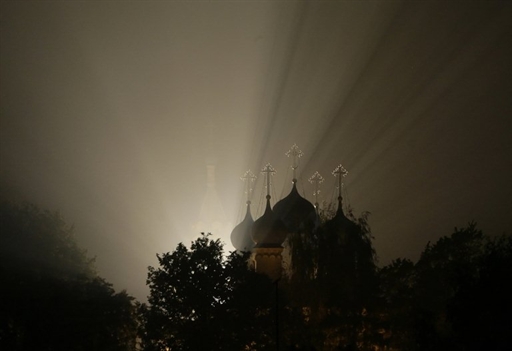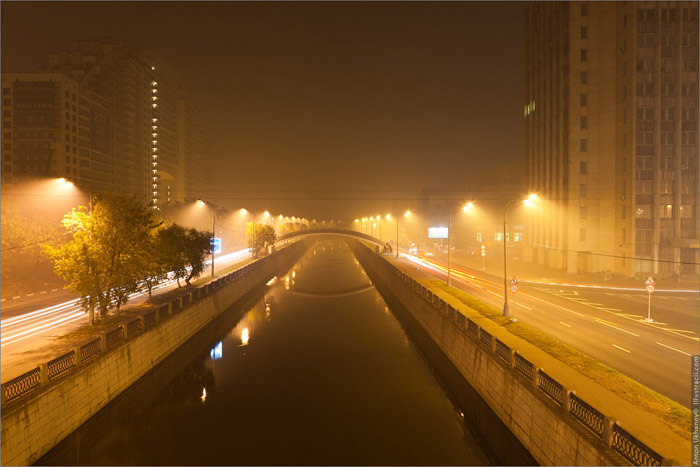If things weren't bad enough... 
Source: http://www.todayszaman.com/tz-web/n...s-pose-nuclear-threat-death-toll-hits-50.html
The Russian government warned on Thursday that the country's deadliest wildfires in nearly four decades posed a nuclear threat if they are not contained, as the death toll rose to 50 and the blazes continued to spread.
The worst heat wave in more than a century is set to intensify on Friday, with record temperatures of 40 degrees Celsius (104 Fahrenheit) expected and to continue into the next week, weather forecasters said. Prime Minister Vladimir Putin announced a ban on exports of grain and grain products from Aug. 15 until December, and his spokesman said it would apply also to contracts already signed.
Emergencies Minister Sergei Shoigu said heat from fires in the Bryansk region, which already has nuclear contamination from the Chernobyl disaster more than 20 years ago, could release harmful radioactive particles into the atmosphere.
In the event of a fire there, radionuclides could rise [into the air] together with combustion particles, resulting in a new pollution zone, he said on state television, without going into detail.
Shoigu added two fires had already broken out in the Bryansk region, some 400 kilometers (250 miles) southwest of Moscow, but they were quickly contained.
Forest and peat bog fires have burned hundreds of homes, leaving thousands homeless in the hottest summer since records began 130 years ago, prompting leaders to declare a state of emergency in seven of the worst-hit regions.
The territory covered by wild fires increased to 756 square miles on Thursday from 730 square miles a day ago, according to the Emergencies Ministry website.
Health Minister Tatyana Golikova told a government meeting that 44 people across the country had died in the fires themselves, while six had died in hospitals, taking the death toll to 50, two more than the day before.
Temperatures in Moscow topped 36 degrees Celsius but a change of wind direction provided some respite in the capital by blowing away oppressive and toxic smoke that had blanketed the city.
Health officials said on Thursday that Moscows air had become relatively clean again, Interfax reported.
The temperature may beat last weeks 38 Celsius absolute record on Friday, topping 40 Celsius, and remain at 35-38 Celsius throughout next week, the deputy director of Rosgidromet meteorological service, Gennady Eliseev, told Itar-Tass news agency.
The military prosecutor for the Moscow region gave orders to protect military sites in the Moscow region after there were widespread reports that a communications centre belonging to the countrys General Staff was burned down in the Moscow region.
The Ministry of Defense denied the reports. However, it also denied last week that fire had ravaged a naval base. President Dmitry Medvedev sacked several senior navy officers on Wednesday after it was revealed that the blaze had indeed occurred.
Worst smog yet hits Moscow, seeps into homes
The city of Moscow was shrouded Friday by a dense smog that grounded flights at international airports and seeped into homes and offices, as wildfires that have killed 50 people nationwide continued to burn.
Planes were diverted from Moscow airports on Friday after huge peat and forest fires blanketed the capital in acrid smoke, forcing some businesses to close and office workers to wear surgical masks at their desks.
Pollution surged to five times normal levels in the city of 10.5 million, the highest sustained contamination since Russias worst heat wave in more than a century began a month ago. Officials urged Muscovites to not venture outdoors.
The fires have torn through forests and villages over the last two weeks with lightning speed, also decimating a military base and threatening an animal shelter with hundreds of inhabitants.
On Friday, visibility in parts of the capital was down to a few dozen yards (meters) due to the smog caused by the fires, which carries a strong burning smell and causes coughing. Airborne pollutants, such as carbon monoxide, were four times higher than average readings -- the worst seen to date in the Russian capital. Dozens of forest and peat bog fires around the city are fanned by southeasterly winds and exacerbated by the countrys most intense heat wave in 130 years of record-keeping.
More than 500 separate blazes were active nationwide Friday, mainly across Russias European territory, according to the Emergencies Ministry.
Up to 2,000 homes have been destroyed in the blazes. Officials have suggested the 10,000 firefighters battling them arent enough. Officials are also scrambling to minimize any further damage, evacuating explosives from other military facilities and sending planes, helicopters and even robots to help control blazes around the countrys top nuclear research facility in Sarov, 300 miles (480 kilometers) east of Moscow.
Source: http://www.todayszaman.com/tz-web/n...s-pose-nuclear-threat-death-toll-hits-50.html




